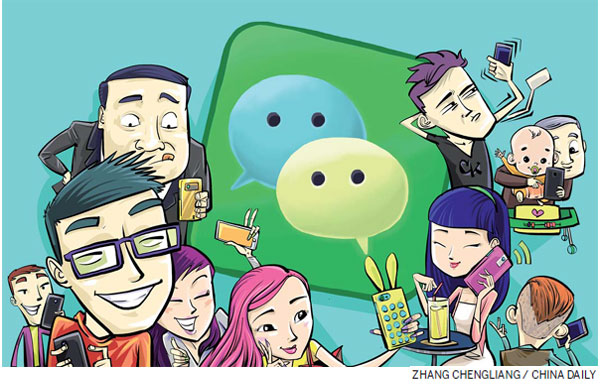That chat is all about WeChat
Updated: 2014-03-21 08:16
By Mike Bastin (China Daily Europe)
|
|||||||||||

Explosive growth of Chinese brand is a warning to well-established names like Whatsapp
Nothing characterizes the fast-moving world of international brand building more than the cluster of social and business networking sites that have exploded on to the scene in recent years, such as LinkedIn, Twitter and, of course, Facebook with its recently acquired Whatsapp messaging service. But is an even more explosive brand building process under way and are these household brands under threat?
Witness WeChat, the mobile messaging arm of China's Tencent Holdings Ltd: In little more than a year, WeChat's regular user base has trebled to more than 300 million but what makes this expansion even more remarkable is that more than 100 million of those users are based outside the Chinese mainland.
Facebook, until now the undoubted king of the social networking industry, is already feeling the effects of WeChat's rapidly increasing international growth with a slowdown in the growth of its user base to just 18 percent year on year. As a result, the recent acquisition of Whatsapp, for a whopping $19 billion (14 billion euros), would appear to represent a strategic riposte in an ever-crowded marketplace.
WeChat's meteoric rise now presents a fascinating "battle of the brands" with its closest international rival, Whatsapp.
But how does Whatsapp compare with high-flying WeChat? Does it offer similar services? And crucially, is it pursuing similar brand building strategies?
First, recent user figures suggest that WeChat is closing the gap with Whatsapp, which has an estimated 500 million subscriber base.
Tencent's WeChat, referred to as weixin (which literally means "micro letter") in Chinese, has also been expanding rapidly outside China, partly as the result of a deliberate change to a more Western-sounding name. WeChat's user base outside China has leaped to a staggering 100 million from fewer than 50 million less than a year ago.
So how has Tencent, which was relatively unknown internationally, managed to build what appears to be an unstoppable brand in such a short space of time?

Tangible product innovation, always an essential part of any effective brand building process, lies at the heart of WeChat's sudden rise.
The brand experience consists of many unique and high-value features that have created differentiation from its global competitors. Specifically, on the messaging side, users can engage in "hold-to-talk" and also send free walkie-talkie style messages that obviate the need for voicemail.
The WeChat brand has also differentiated itself effectively from competitor offerings by finding a perfect fusion between the slightly more open approach of social networking sites on which anyone can follow anybody, the Twitter approach; and the more closed networking sites typified by Facebook, which rely on mutual friend connections. The WeChat brand is, therefore, underpinning its growth through social connection and not just social media.
Furthermore, the "people nearby" facility can make the daily commute or a night out with friends much more interesting.
Overall, it is evident that WeChat is striving to build on the original messaging service and provide a "one-stop shop" e-commerce service - from a platform for chatting to shopping, gaming, and even financial services. In China, WeChat even allows users to book a doctor's appointment or order a taxi.
Most recently, Tencent's WeChat brand pushed even further into e-commerce territory by allowing users to buy items or services inside the app.
However, what would appear to make WeChat's brand building sustainable are the myriad fun discovery features that can connect users locally and across continents, and the generally emotional brand association.
A perfect example of such emotional brand building came with this year's Chinese New Year. WeChat users were given the opportunity to send a Chinese New Year's "red envelope" of digital cash. Senders first had to link the app to their bank accounts and were then able to transfer specified amounts of money to their fellow Wechat contacts through a personal message. WeChat also allowed users to put the cash up for grabs in chat rooms full of friends. Recipients were then able to transfer the funds into their own bank accounts.
In contrast, Whatsapp has built little on its original text messaging offering.
Did we see anything similar on Whatsapp during recent Western festivals such as Thanksgiving, Christmas and New Year? We did not.
Such stagnation has left a gap in the market that Tencent and the WeChat brand have filled admirably with what are now a clear set of emotional as well as rational brand values. Fun, excitement and, above all, friendship and even romance have become associated deeply with the WeChat brand experience.
The re-branding from weixin to WeChat also provides a clever contribution, something from which the competition can learn plenty.
Whatsapp, on the other hand, with Facebook's recent takeover has shot to fame in the global e-commerce industry but has developed little or no emotional brand image. Facebook's Whatsapp "brand" and others like it, while successful at the moment, rely on the perception of "competence" and "trust" only.
This gap in emotional association between the brands could prove decisive as WeChat continues with ambitious new products and market expansion plans. Any technological competitive advantage and trust gained from industry experience that WeChat's competitors may hold at present is likely to be short-lived.
To preserve and improve the WeChat brand's intangible and emotional image further associations will be needed. Design and refinement of creative logos, catchphrases, colors and many other associations should be an integral part of WeChat's international brand expansion.
WeChat is now engaged in a battle of emotional brand association and not just a race for the latest technology.
Sustainable competitive advantage can only be maintained with a powerful set of emotional associations in addition to the typical rational values that characterize the current Whatsapp brand and many other hi-tech, Internet brands.
Economic history is replete with examples of the often dramatic vicissitudes in brand fortunes where over-reliance on rational brand values is concerned. The Nokia brand's capitulation provides a prime example.
This is not say that WeChat's attempted usurpation of Facebook's Whatsapp messaging service will be plain sailing. Not at all. E-commerce is still dogged by security and privacy issues. Here, the more serious, experienced and rational Facebook brand maintains a clear advantage over the younger WeChat brand.
Perhaps WeChat's greatest competitor is in fact itself. Technological innovation will surely continue to play a key role in WeChat's international brand building which could lead to neglect of the equally important development of effective emotional associations. Creativity on both fronts is essential if sustainable competitive brand advantage is to be achieved internationally.
As WeChat's brand continues its rollout overseas, it is also important that businesses of all sizes and from all industries become familiar with the brand and most importantly its regular uses and the brand experience.
Western companies, especially those with current and future product brands targeted at younger age groups, cannot afford to ignore the rise of the WeChat brand. Brand building across Europe and the United States will become more difficult without a deep understanding of WeChat's user base and will probably require some sort of sponsorship of the WeChat brand itself in the near future and/or other forms of promotion on the WeChat site.
For example, immediate consideration should be given to Tencent's launch of online payment service Tenpay, soon to be integrated with the WeChat brand. European and US business vendors should have sufficient foresight to take more than an interest in a service that their current and future customers may soon be demanding.
WeChat's explosive emergence and rapid development as an emotional brand should be welcomed by the international business community. Increased competition in the social and business networking industry can only be a good thing for the wider business environment, customers and companies.
WeChat's brand building should also be welcomed by international businesses keen to develop brands with a similar level of emotional attachment. WeChat's emergence is also good news for Chinese companies generally. It exemplifies the new, modern, brand-oriented wave of Chinese company.
The author is a visiting professor at the University of International Business and Economics in Beijing and a senior lecturer on marketing at Southampton Solent University's School of Business. The views do not necessarily reflect those of China Daily.
(China Daily European Weekly 03/21/2014 page14)
Today's Top News
China, the Netherlands seek closer co-op
Crimea is part of Russia
Images may help solve jet mystery
Obamas wowed by China
Xi leaves Beijing for first trip to Europe
Beijing beefs up hunt for missing jet
Putin signs law on Crimea accession
Australia to resume ocean search for missing jet
Hot Topics
Lunar probe , China growth forecasts, Emission rules get tougher, China seen through 'colored lens', International board,
Editor's Picks

|

|

|

|

|

|





